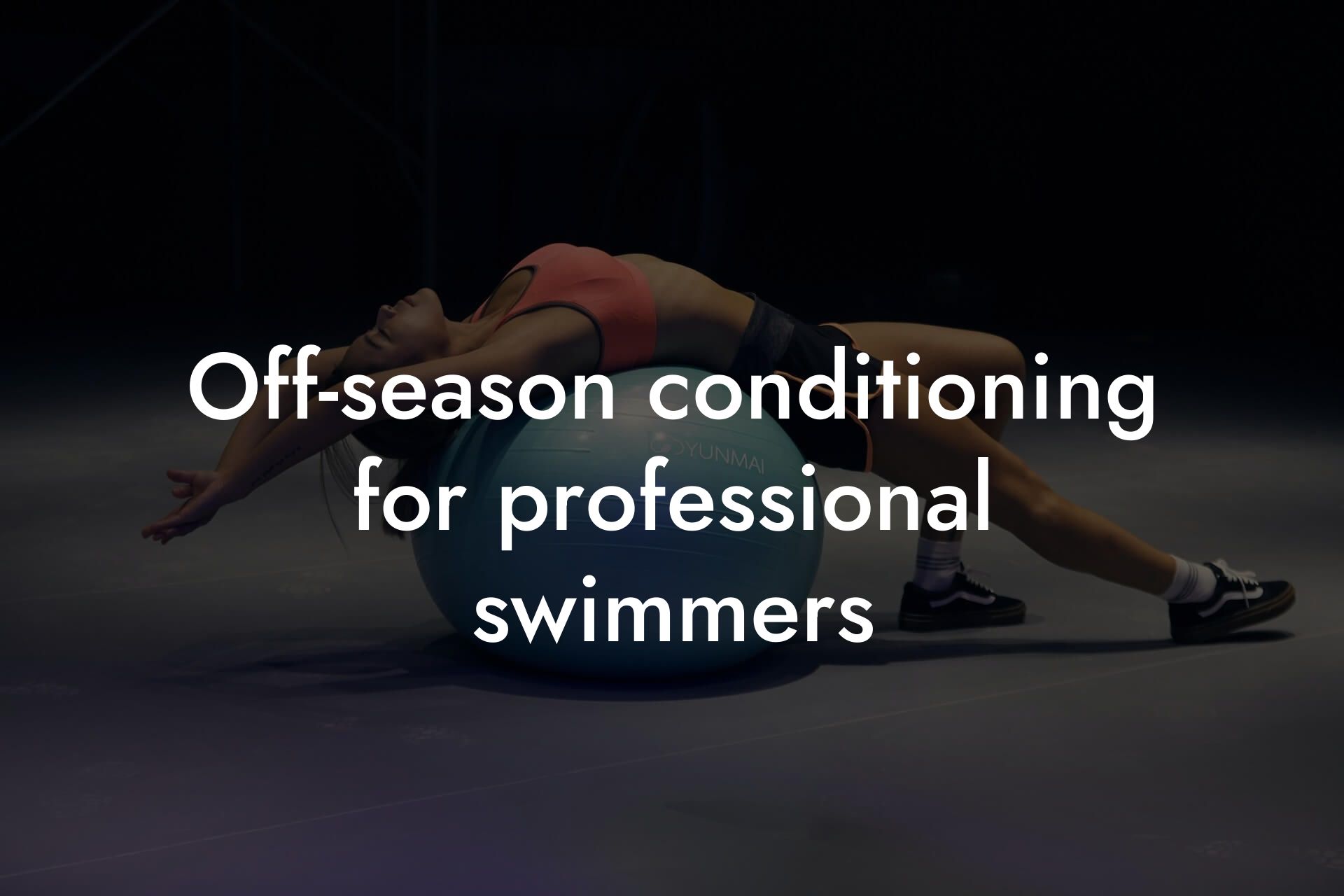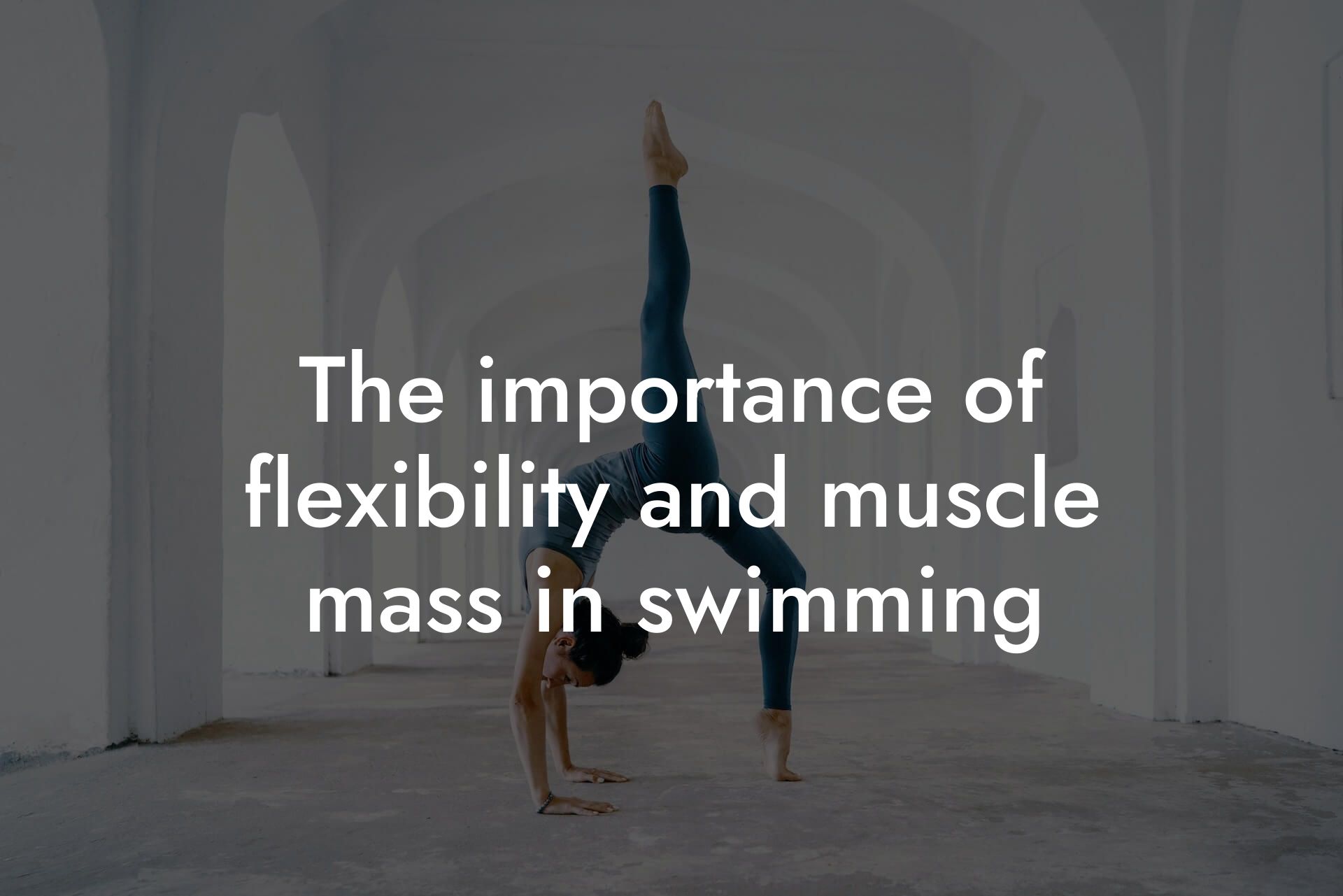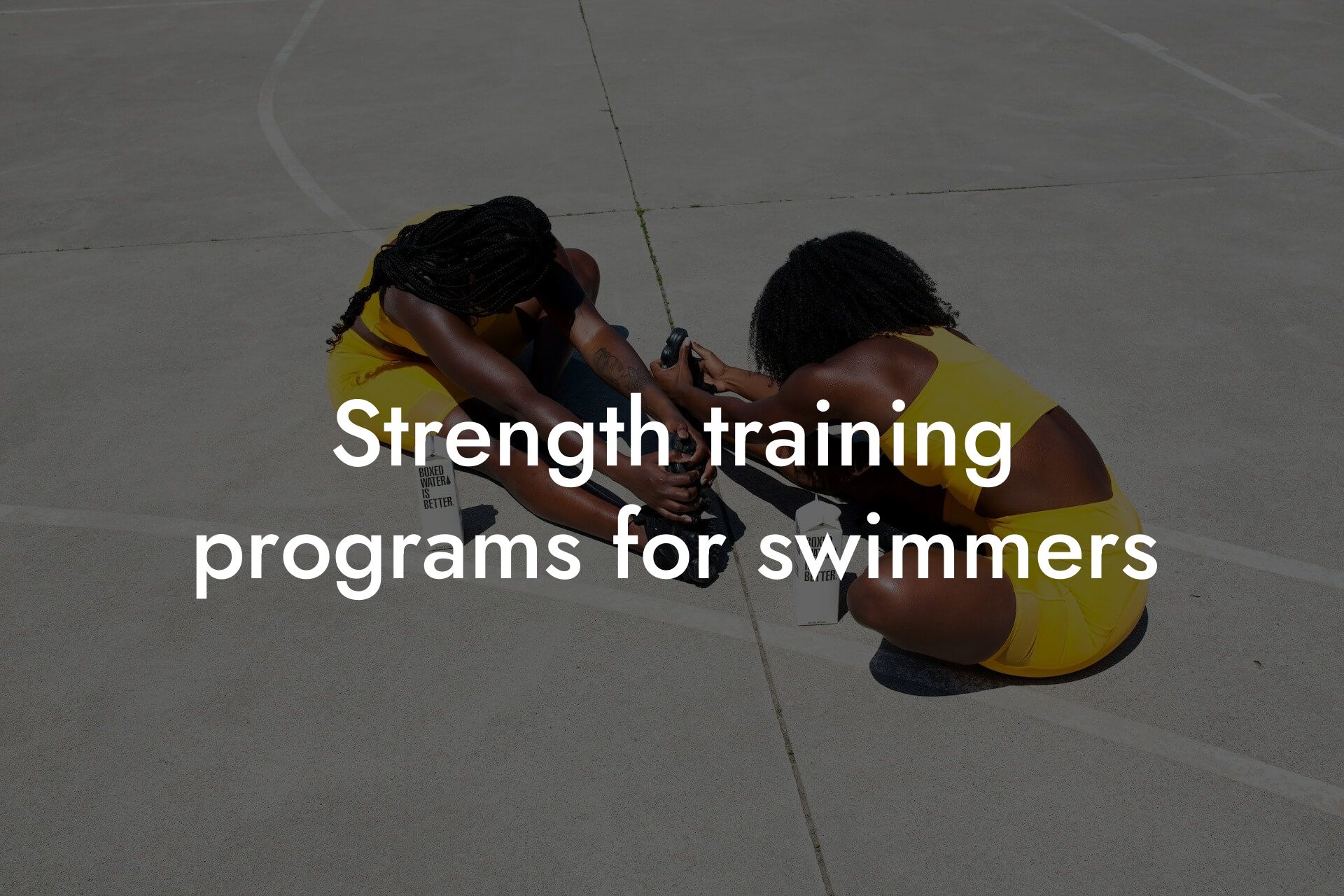As a high-earning professional, you understand the importance of maintaining peak physical performance to excel in your career. For swimmers, nutrition plays a critical role in sustaining energy levels throughout their training and competition. A well-planned diet can make all the difference in achieving optimal performance. In this article, we will delve into the essential nutrition strategies for swimmers to maintain energy levels and take their performance to the next level.
Table of Contents
Understanding Energy Needs
Swimming is a high-intensity sport that requires a significant amount of energy. The energy expenditure of swimmers varies depending on the intensity, duration, and frequency of their training sessions. On average, a competitive swimmer can burn between 500-800 calories per hour of swimming. To maintain energy levels, swimmers need to consume a diet that provides adequate calories, macronutrients, and micronutrients.
Macronutrient Breakdown
A swimmer's diet should consist of a balanced mix of carbohydrates, protein, and fat. The ideal macronutrient breakdown is:
- Carbohydrates: 55-65% of daily calories (focus on complex carbs such as whole grains, fruits, and vegetables)
- Protein: 15-20% of daily calories (emphasize lean protein sources like lean meats, fish, eggs, dairy, and plant-based options)
- Fat: 20-25% of daily calories (include healthy fats like nuts, seeds, avocados, and olive oil)
Hydration and Electrolytes
Adequate hydration is crucial for swimmers, as water makes up approximately 60% of an athlete's body weight. Swimmers should aim to drink at least 8-10 glasses of water per day, with an additional 17-20 ounces of water 2-3 hours before training or competition. Electrolytes, such as sodium, potassium, and magnesium, are also essential for maintaining proper hydration and nerve function. Include electrolyte-rich foods like bananas, dates, and coconut water in your diet.
Pre-Workout Nutrition
The pre-workout meal or snack should provide a boost of energy, while also being easy to digest. Aim to consume a balanced meal or snack 1-3 hours before training or competition, consisting of:
- Complex carbohydrates (whole grains, fruits, or vegetables)
- Lean protein (lean meats, fish, eggs, dairy, or plant-based options)
- Healthy fats (nuts, seeds, or avocados)
Examples of pre-workout meals or snacks include oatmeal with banana and honey, whole-grain toast with avocado and eggs, or a smoothie bowl with Greek yogurt, berries, and almonds.
Post-Workout Nutrition
The post-workout meal or snack is critical for recovery and replenishing energy stores. Aim to consume a meal or snack within 30-60 minutes after training or competition, consisting of:
- Carbohydrates (simple and complex) to replenish energy stores
- Protein to aid in muscle repair and recovery
Examples of post-workout meals or snacks include a banana with peanut butter, a protein shake with fruit, or a meal with grilled chicken, sweet potatoes, and green beans.
Meal Frequency and Timing
To maintain energy levels, swimmers should aim to eat 4-6 main meals and 2-3 snacks per day, spaced out every 2-3 hours. This includes:
- 3 main meals (breakfast, lunch, and dinner)
- 2-3 snacks (mid-morning, pre-workout, and post-workout)
- 1-2 evening snacks (optional)
Supplements and Ergogenic Aids
Certain supplements and ergogenic aids can help swimmers maintain energy levels and enhance performance. These include:
- Creatine monohydrate: increases muscle strength and endurance
- Beta-alanine: delays fatigue and improves high-intensity exercise performance
- Branched-Chain Amino Acids (BCAAs): reduces muscle soreness and fatigue
- Caffeine: enhances focus, concentration, and exercise performance
However, it is essential to consult with a healthcare professional or registered dietitian before adding any supplements to your diet.
Periodized Nutrition
Periodized nutrition involves tailoring your diet to specific training phases. This includes:
- Endurance phase: focus on carbohydrate loading and adequate hydration
- Strength phase: emphasize protein intake for muscle repair and growth
- Taper phase: reduce carbohydrate intake and focus on recovery nutrition
By periodizing your nutrition, you can optimize your energy levels and performance during each training phase.
In conclusion, a well-planned diet is essential for swimmers to maintain energy levels and achieve optimal performance. By understanding energy needs, macronutrient breakdown, hydration, and electrolyte requirements, swimmers can fuel their bodies for success. Additionally, incorporating pre- and post-workout nutrition, meal frequency and timing, supplements, and periodized nutrition can further enhance performance. Remember to consult with a healthcare professional or registered dietitian to create a personalized nutrition plan tailored to your specific needs.
Frequently Asked Questions
What are the best foods for swimmers to eat for energy?
As a swimmer, it's essential to fuel your body with the right foods to maintain energy levels. Focus on complex carbohydrates, lean proteins, and healthy fats. Whole grains, fruits, vegetables, lean meats, and nuts are all excellent choices. Avoid sugary and processed foods that can cause energy crashes.
How many calories do swimmers need to consume daily?
The daily caloric needs of swimmers vary depending on factors such as age, weight, and training intensity. Generally, swimmers require 2,500-4,000 calories per day. However, this can increase to 5,000-6,000 calories for elite athletes. Consult with a sports dietitian or coach to determine your individual caloric needs.
What is the importance of hydration for swimmers?
Proper hydration is crucial for swimmers, as it helps regulate body temperature, transport nutrients, and remove waste products. Aim to drink at least 8-10 glasses of water per day, and make sure to drink water during and after training sessions.
What are some healthy snack options for swimmers?
Healthy snacking is essential for swimmers to maintain energy levels. Opt for snacks rich in complex carbohydrates and protein, such as fruits, nuts, energy bars, and sandwiches. Avoid sugary and high-caffeine snacks that can cause energy crashes.
Can swimmers follow a vegan or vegetarian diet?
Absolutely! With proper planning, swimmers can thrive on a vegan or vegetarian diet. Focus on plant-based protein sources like legumes, beans, and tofu, and ensure you're getting enough iron, zinc, and B12. Consult with a sports dietitian or coach for personalized guidance.
How does protein intake affect swimmers' performance?
Protein is essential for swimmers, as it helps build and repair muscles. Aim to consume 1.2-1.6 grams of protein per kilogram of body weight daily, spread out over 3-5 meals. This will help support muscle growth and recovery.
What is the role of carbohydrates in swimmers' diets?
Carbohydrates are the primary source of energy for swimmers. Focus on complex carbohydrates like whole grains, fruits, and vegetables, which provide sustained energy release. Aim to consume 2-3 grams of carbohydrates per kilogram of body weight daily.
How does fat intake impact swimmers' performance?
Fat is an essential source of energy for swimmers, particularly during low-intensity training. Focus on healthy fats like nuts, seeds, avocados, and olive oil, which provide sustained energy release and support overall health.
What are some common nutrition mistakes swimmers make?
Common nutrition mistakes swimmers make include inadequate hydration, poor timing of meals, and insufficient carbohydrate and protein intake. Avoid these mistakes by fueling your body with the right foods at the right times.
How can swimmers optimize their nutrition for competition?
To optimize nutrition for competition, swimmers should focus on carbohydrate loading, adequate hydration, and strategic meal timing. Aim to consume a balanced meal 2-3 hours before competition, and snack on carbohydrates and electrolytes during the event.
What is the importance of post-workout nutrition for swimmers?
Post-workout nutrition is critical for swimmers, as it helps with recovery and muscle repair. Aim to consume a mix of carbohydrates and protein within 30-60 minutes after training, and continue to fuel your body with balanced meals throughout the day.
Can swimmers take supplements to improve performance?
While supplements can be beneficial, swimmers should prioritize whole foods and consult with a sports dietitian or coach before adding any supplements to their regimen. Always choose reputable brands and follow the recommended dosages.
How does nutrition impact swimmers' recovery?
Nutrition plays a critical role in swimmers' recovery. A balanced diet that includes carbohydrates, protein, and healthy fats helps repair muscles, replenish energy stores, and reduce inflammation. Adequate hydration and electrolyte intake are also essential for recovery.
What are some nutrition tips for swimmers with busy schedules?
For swimmers with busy schedules, meal prep and planning are key. Prepare healthy meals and snacks in advance, and keep them easily accessible. Consider working with a sports dietitian or coach to develop a personalized nutrition plan.
How does nutrition impact swimmers' mental performance?
Nutrition has a significant impact on swimmers' mental performance. A balanced diet that includes omega-3 fatty acids, complex carbohydrates, and lean proteins helps support brain function, reduce stress, and improve focus.
What are some common nutrition myths swimmers should avoid?
Common nutrition myths swimmers should avoid include the idea that carbohydrates are bad, protein shakes are necessary, and fat is unhealthy. Focus on evidence-based nutrition advice and consult with a sports dietitian or coach for personalized guidance.
How can swimmers monitor their nutrition and progress?
Swimmers can monitor their nutrition and progress by tracking their food intake, weight, body fat percentage, and performance metrics. Regularly review your progress with a sports dietitian or coach to make adjustments and optimize your nutrition plan.
What is the role of electrolytes in swimmers' nutrition?
Electrolytes, such as sodium, potassium, and magnesium, are essential for swimmers, as they help regulate fluid balance, nerve function, and muscle contractions. Include electrolyte-rich foods like bananas, avocados, and nuts in your diet, and consider adding electrolyte supplements during intense training.
How does nutrition impact swimmers' bone health?
Nutrition plays a critical role in swimmers' bone health. A diet rich in calcium, vitamin D, and omega-3 fatty acids helps support bone density and reduce the risk of injuries. Consult with a sports dietitian or coach to develop a personalized nutrition plan.
What are some healthy breakfast options for swimmers?
Healthy breakfast options for swimmers include oatmeal with fruit and nuts, whole-grain toast with avocado and eggs, and Greek yogurt with berries and honey. Aim for a balanced breakfast that includes complex carbohydrates, protein, and healthy fats.
How can swimmers stay motivated to maintain a healthy diet?
Swimmers can stay motivated to maintain a healthy diet by setting realistic goals, tracking progress, and celebrating small victories. Surround yourself with supportive teammates and coaches, and remind yourself of the benefits of a healthy diet, such as improved performance and overall health.
What are some nutrition tips for swimmers during travel?
During travel, swimmers should prioritize hydration, pack healthy snacks, and research local restaurants and grocery stores. Aim to maintain a balanced diet, and consider working with a sports dietitian or coach to develop a personalized nutrition plan for travel.
Here are some related articles you might love...
- Off-season conditioning for professional swimmers
- The importance of flexibility and muscle mass in swimming
- Strength training programs for swimmers
- Using DEXA scans to optimize swimmer performance
- Bone density and its impact on injury prevention in swimming
- Recovery techniques for swimmers after intense training
- Balancing strength and endurance in swimming
- The role of body composition in swimming speed and endurance
- Reducing body fat for better buoyancy and speed in swimming
Zak Faulkner
Zak Faulkner is a leading authority in the realm of physical health and body composition analysis, with over 15 years of experience helping professionals optimise their fitness and well-being. As one the experts behind Tano Performance Group, Zak has dedicated his career to providing in-depth, science-backed insights that empower clients to elevate their physical performance and overall health.
With extensive knowledge of DEXA technology, Zak specializes in delivering comprehensive body assessments that offer precise data on body fat, muscle mass, bone density, and overall physique. His expertise enables individuals to make informed decisions and achieve their fitness goals with accuracy and confidence. Zak’s approach is rooted in a deep understanding of human physiology, combined with a passion for helping clients unlock their full potential through personalised strategies.
Over the years, Zak has earned a reputation for his commitment to excellence, precision, and client-focused service. His guidance is trusted by top professionals who demand the best when it comes to their health. Whether advising on fitness programs, nutritional strategies, or long-term wellness plans, Zak Faulkner’s insights are a valuable resource for anyone serious about taking their health and fitness to the next level.
At Tano Performance Group, Zak continues to lead our Content Team revolutionising how professionals approach their physical health, offering unparalleled expertise that drives real results.




